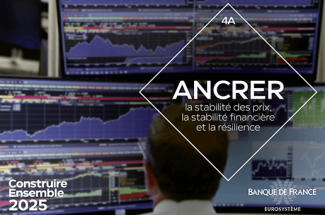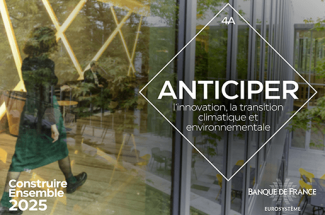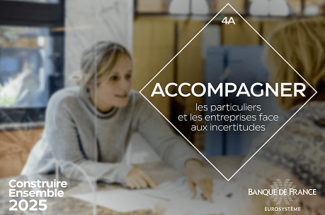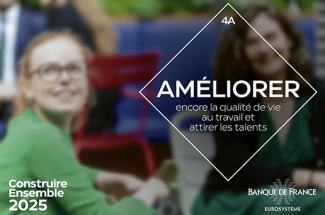To perform its missions effectively and set a clear course in an increasingly uncertain and fragmented world, the Banque de France has drawn up a strategic plan entitled Building 2025 Together. The plan addresses 7 key challenges:
- shifts and shocks
- inflation
- financial stability
- climate change
- technological change
- social and local issues
- employer attractiveness
Building 2025 Together provides four responses to these challenges, which can be summed up in four verbs: Anchor, Anticipate, Assist and Enhance.
These four responses have been broken down into 28 actions and are accompanied by 12 concrete indicators to measure the plan's success.
7
key challenges: shifts and shocks, inflation, financial stability, climate change, technological change, social and local issues and employer attractiveness
4
responses to these challenges, which can be summed up in four verbs: Anchor, Anticipate, Assist and Enhance
28
actions in the Building 2025 Together strategic plan
12
concrete indicators to measure the success of the plan

Anchor price stability, financial stability and resilience
The Banque de France is anchoring price stability by striving to lower inflation to 2% by 2025. It is reasserting its financial stability mandate by refining its analysis of the risks to the financial system from exogenic shocks, including climate shocks, and has incorporated climate risk into its conduct of monetary policy. The Banque de France is also working to increase the financial system’s cyber resilience, while at the same time enhancing its own operational resilience with high-level crisis-management systems and cybersecurity.

Anticipate innovation and the climate and environmental transition
The Banque de France is simplifying its information system, both technically and functionally, and using artificial intelligence to make processes more fluid. It is encouraging innovation in all its core activities, especially in the field of “enhanced supervision”. It is also seeking to exploit internal and external data to better anticipate the changes of the future. In the payments sphere, the Bank is working on a digital euro and on tokenised finance, while also safeguarding the future of its cash activities and improving their economic and environmental performance. Regarding the climate and environmental transition, it has asserted its role as a pioneer in fighting climate change through its involvement in the Network for Greening the Financial System (NGFS). It is now stepping up its contribution by incorporating the economic and financial risks linked to nature and biodiversity loss into its conduct of monetary policy.

Assist individuals and businesses in dealing with uncertainty
The Banque de France is improving the user experience for beneficiaries of its financial inclusion products by simplifying and digitalising services, and designing tools to better understand customer needs. It is broadening access to financial education and increasing its dialogue with the public to build up trust in the central bank. Part of this strategy involves holding regular Q&A sessions with citizens, in Paris and throughout the country. For entrepreneurs, the Banque de France offers a wide range of services and analytical tools (credit mediation, VSE-SME correspondents, portal for company directors, OPALE free financial assessments). It also compiles financial and non-financial indicators: company ratings and climate indicators.

Enhance the quality of life in the workplace and attract talent
The Banque de France is constantly improving the quality of life in the workplace by modernising the work environment, regularly reviewing its management model and staff working methods, and simplifying its processes. It supports managers and staff by providing dedicated training and disseminating good practices. It has been recognised as an attractive employer and wants to remain so by continuing to foster staff loyalty.
Updated on the 3rd of October 2024
